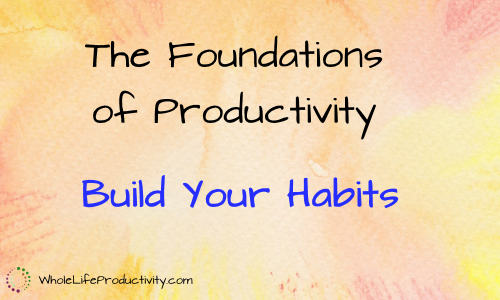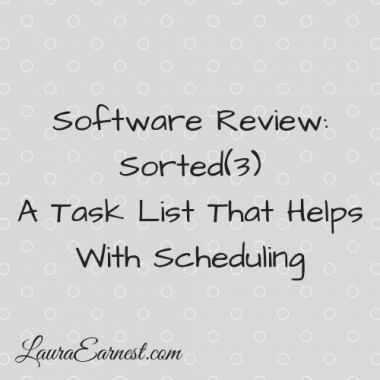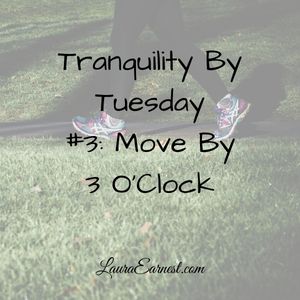
Build Your Habits: The Foundations of Productivity

Want A Summary of the Series?
Become a Legacy Patreon Subscriber and get access to all past Patreon rewards, including the exclusive summary of all the Foundation articles!
Productivity requires a solid foundation if the methods are going to be successful. Just like every building must have a solid foundation if it is going to remain standing, productivity must also have a solid foundation unless you want it to crumble underneath you.
We are in a ten-article series on the foundations of productivity. Today we will look at another fundamental process: build your habits.
Habits Get A Bad Rap
Many people decry habits as bad things, because they can lead to doing things automatically, and thus to inflexibility.
Yes, they can.
Habits, by their very nature, are supposed to be automatic. So things get done without you thinking about it.
Why Habits Are Good
At the same time, doing things automatically means that you don’t have to think about them. And that frees up your brain space to be working on other items.
Consider this for a moment. If something you need to do is habitual, you don’t think about it, you just do it. This means that you don’t have to consider the logistics of going to the gym, for instance. You just pack your bag and go, out of sheer habit. You don’t have to convince yourself to go, you don’t procrastinate. You just get it done.
This automatic action toward your goal means that you don’t have to think about it. You don’t have to plan. You don’t have to rethink the steps every day. You just do it.
How Habits Play Into Productivity
Habits are the foundation of a good productivity system.
If you had to stop and consider all the details of everything you do every day, you would exhaust yourself. Or you would have to build massive lists in order to accomplish things.
Let’s look at this from a first-thing-in-the-morning perspective.
The alarm goes off. Do you get up or not? Have you had that debate with yourself? You know how much effort it can take to force yourself out of bed.
Next, you need to get ready for the day. That would involve clothing, personal care, and grooming. Think about how much effort it takes to think about what you are going to wear. Ever been stuck in front of the clothing trying to decide? What about all the things you do for grooming and personal care? How much would it add to your expended brain effort if you had to remember to brush your teeth every morning, shower, dry your hair, shave or put on makeup, etc.
Yet by having habits, we don’t think about it, we just do it. And we have more energy to start the day because we haven’t had to spend the energy thinking about the automatic stuff.
Habits Should Be For Things That Need To Be Done
The danger of habits is that we don’t want to build habits around things that really don’t need to be done. For example, you wouldn’t want to be doing something every day that was unnecessary. As a habit, you wouldn’t think about it, and you would do the task and waste the time and effort.
For instance, let’s say it was your habit to put out food for penguins. You did it every day, not thinking about the 10 minutes it took you to do; and yet it furthered no goal and really didn’t need to be done. After all, you don’t live where the penguins do. 10 minutes a day over a year adds up to over 60 hours of time a year. That’s a working week and a half. But as a habit, you would just do it without further consideration.
That’s a danger, not to mention not a good way to spend your time.
How To Build Your Habits To Boost Productivity
Habits can be built on purpose, with the end goal of boosting productivity. Anything that can be made habitual…and that needs to be done…can further your productivity.
The first thing to do is to set a goal with what you want to do. As an example, let’s say you want to read more non-fiction. It’s hard for you to find time to do that, so you put it off until you have a chunk of time to devote to reading…which means it never gets done.
So here is how you can approach building a productivity habit.
- Make it small. As I learned from the book Mini-habits [Insert Link], the best way to make habits is to make the first actions so small that it takes no effort to do them. For our example, you might not have time to read a chapter a day. You might not have time to read five pages. But I bet there is a level where you say, “Sure, I could read x paragraphs/pages a day.” For me, it is two pages, and that is Kindle pages, with the font popped up rather large. By setting the goal so small, I am assured it will happen. Because even on the super-rushed days, I can find the two minutes it will take to read the pages.
- Tie it to something else. New habits are best tied to something else. If you wanted to get into the habit of flossing every day, you would tie it to cleaning your teeth. It doesn’t make sense to tie it to locking your front door. My reading habit is tied to my first-thing-in-the-morning writing session. I spend some time doing personal development work every day, and this was the logical time to put it in place.
- Make sure it happens. Life gets in the way sometimes. However, that doesn’t mean your habit should fall by the way just because your routines are disturbed. You should have a way to make sure it happens by a given time. In the case of my reading, I have an alarm set for 6:30 pm, and if the alarm goes off and I realize I haven’t done my reading, I will take the two minutes to do it right then.
- Be accountable. Habits are formed by repetition, but few can maintain something without some system of encouragement. Jerry Seinfeld had a calendar where he marked off the days he completed a habit. There are apps out there to help you with this as well. Or maybe you need an accountability partner to help you stick to it. For my reading, I use an app on my phone that helps me track my habits called Streaks.
Conclusion
Habits can boost your productivity if they are specifically designed to do so. Set a goal that will further your projects, and set up the habits by making it small, tied to something else and with a way to make sure it happens and track your progress. Watch your productivity soar by putting it on auto-pilot!
Want A Summary of the Series?
Become a Legacy Patreon Subscriber and get access to all past Patreon rewards, including the exclusive summary of all the Foundation articles!




